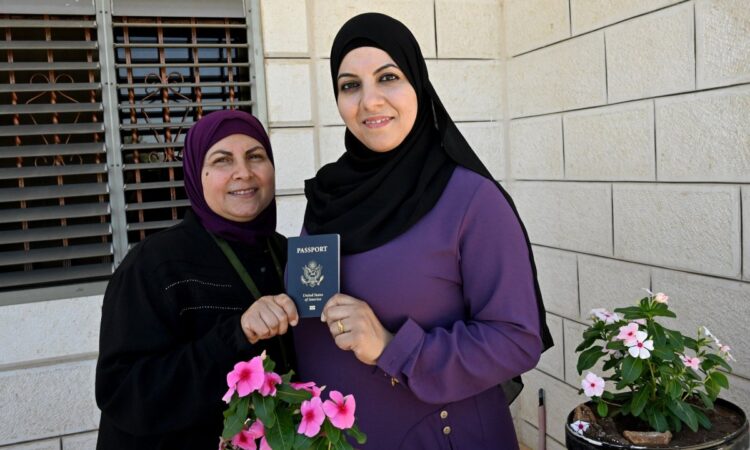
Palestinian Americans Ameena AbuAwad, 34, and her Aunt Nuha Khraiwish, 54, welcomed the prospect of traveling out of nearby Ben Gurion Airport, but said they worried Israel or Jordan may not allow their free entry into Israel for long. Photo by Debbie Hill/UPI
Ameena AbuAwad said traveling to Jordan for flights adds days and hundreds of dollars to the trip. Photo by Debbie Hill/UPI
Palestinian American Made Khoury said she and her siblings were excited about the prospect of flying out of nearby Ben Gurion Airport in Israel but didn’t want to get her hopes up until the agreement exits the trial period. Photo by Debbie Hill/UPI
WEST BANK, July 21 (UPI) — Israel’s decision to allow Americans living in the West Bank to enter the country is an exciting prospect that would allow Palestinian Americans to return to the United States more easily but some worry the practice could be short-lived.
Beginning Thursday, Israel agreed to allow “any American” citizen, including those with dual citizenship and residents of Judea, Samaria and the Gaza Strip to enter in exchange for Israeli’s being granted permission to enter the United States visa-free for trips lasting up to 90 days once it is admitted into the U.S. Visa Waiver Program.
Advertising
A group of Palestinian American women told UPI in interviews Friday that the deal would reduce the cost and time required to travel out of the West Bank but they worried Israel would revoke their access as soon as it is admitted into the waiver program.
Madees Khoury, 37, a brewer and general manager of Taybeh Beer in the West Bank, said she and her siblings were excited about the prospect of flying out of nearby Ben Gurion Airport in Israel. But she didn’t want to get her hopes up until the agreement exits the trial period.
Khoury, who lived in Boston until she was 14, said it takes her two days to travel between her West Bank home and Amman Airport in Jordan, as she racks up costs booking a hotel stay upon arriving before her flight and even more for travel to the airport.
“It’s time-consuming and expensive to go to Jordan, when I could take a taxi 50 minutes to Ben Gurion Airport from home,” she said.
Ameena AbuAwad, 34-year-old from Chicago who works as a medical assistant and English teacher in Ramallah, West Bank, said traveling to Jordan with her five children often adds two days and hundreds of dollars to the cost of the trip.
“For our family of seven, we spend $90 for a taxi to Jericho, where we pay taxes to Israel and for a bus to take us a short distance to the Allenby Bridge Crossing into Jordan,” AbuAwad said.
“The taxes and the bus cost approximately $50 for each person, plus extra for each suitcase. That’s at least $420 extra since we can’t fly from Ben Gurion Airport.”
She added the bus often stops at a border line for up to 3 hours, leaving her children “restless and crying” and that more time and expenses await on the Jordanian side as Israeli security check their bags and they are required to pay a Jordanian travel tax of $32.57 a person.
AbuAwad and her aunt, Nuha Khraiwish, 54, who lives in Chicago but has a home in Turmus Aya, West Bank, added that Jordan seeks to capitalize on the situation as flights from the Jordanian airport are often scheduled at times that make it unreasonable to depart the same day they arrive from the West Bank, necessitating a hotel stay that can cost more than $100.
“If this United States-Israeli plan really goes through, then it will mean money saved and also more time with family, since we don’t have to go through Jordan,” Khraiwish said.
“But I’m worried the Jordanians will try and kill the possibility for Palestinian Americans to fly out of Ben Gurion Airport since we are big business for them.”





